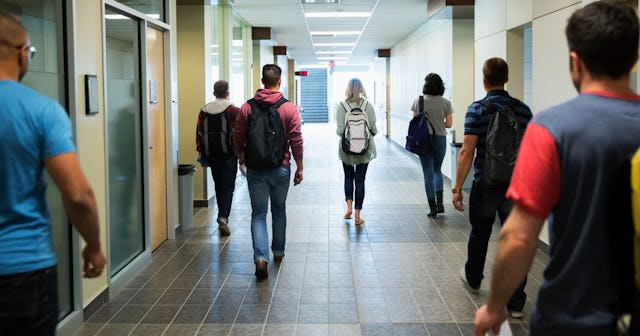Teens Are Rapidly Losing Trust In Both Police And The Justice System

High schoolers trust social institutions, like their schools and churches, but they’re wary of law enforcement and the courts
It’s totally normal for teenagers to start doubting authority for the first time in their lives – it’s simply part of development into healthy adults. But new research has found that high schoolers don’t become untrusting of all types of authority equally.
In fact, especially in recent years, as a spotlight has been shone on issues in our police departments and courts, teens have become significantly more wary of law enforcement and the justice system even when their trust in their religious institutions and schools remains steady.
The research was published by the American Psychological Association and appeared in this month’s issue of the journal Developmental Psychology. It used data compiled between 2006 and 2017 from 10,000 students involved in the Monitoring the Future study, which consists of annual, self-reported surveys of 12th grade students across the country.
They were most surprised to find that high school seniors’ views of law enforcement and the justice system plummeted between 2015 and 2017, while other areas, such as social organizations, held steady.
“We found that adolescents’ trust in law enforcement in particular declined more rapidly in recent years than their confidence in any other authority,” said lead author Adam D. Fine, a professor at Arizona State University. “Our results contradicted the common stereotype that teens have ‘anti-authority’ attitudes because trust in schools and religious organizations was not affected. This shows that by 12th grade, teens are clearly able to differentiate among different types of authority.”
In other words, even though it’s natural for kids to become less enamored with authority generally, by the time they’re getting ready for college, their anti-authoritarian leanings are thoughtful and based on information they’ve collected around them.
“As children become teenagers, they begin to question authority more frequently and more skillfully,” said Fine. “Adolescents may critically evaluate authority figures in all aspects of their lives, including at home, at school and in their communities.”
While there’s not evidence to connect them directly, researchers seemed confident that this drop in authority was linked to the recent focus on police brutality and the Black Lives Matter movement, not to mention issues in the justice system, such as rapists getting lenient sentences and minorities being treated unfairly when it comes to sentencing.
“Given the current conversations surrounding unjust policing in the United States, we were not surprised to find that youth do, in fact, differentiate among authorities, and something unique is happening when it comes to their perceptions of law enforcement and the justice system,” said Fine. “However, America’s teens do not have a ubiquitous ‘anti-authority’ attitude as their confidence in social institutions remained higher and more stable.”
The solution? Instead of fixing the teens’ perceptions of these institutions, we have to start fixing these institutions.
“Considering that negative perceptions of legal authority have been linked to involvement in crime and crime reporting, the real-world implications are quite clear. Efforts must be made to improve biased and unjust policing practices,” said study author Elizabeth Cauffman, a University of California, Irvine professor of psychological science.
The team also broke down their findings by race. Not surprisingly, black teens — who get wrongfully shot by police at shocking rates — had the least faith in law enforcement, followed by Latinos and white participants. Black kids also had significantly more faith in their schools than white kids, showing that it’s not that they don’t generally lack trust, it’s that they lack trust of places they’ve learned to distrust. This makes their loss of faith in police “even more salient,” Fine said.